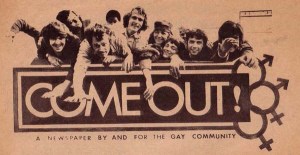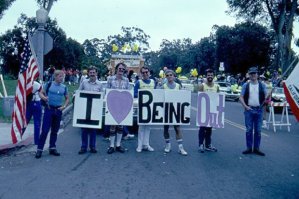When I realized I was gay I came out with a vengeance. When I realized I was transgender I came out with a whimper.
I came out in my residence hall my first week at college. I came out to my mother and brother at the end of my freshman year. I came out to my co-workers on every job. I came out because I believe there is no point to being in the closet. Being gay is nothing to be ashamed of or to keep private. Being gay means being out.
I fit the butch stereotype of a masculine female. I show up on everyone’s gaydar but not on their transdar. When asked “Don’t butch lesbians just want to be men?” I said “No!” because it was the “correct” answer. Even though it wasn’t true, for me.
Coming out as transgender is different from coming out as gay. Different presumptions. When I tell you I am gay I am stating that I am sexually and romantically attracted to women. When I tell you I am trans I am stating that I don’t self-identify with my birth sex or the gender imposed upon me when I was born.
When I say I am transgender it does not mean that I am transitioning from female to male. It is hard for me to explain what I am doing, or to put a label on it. My so-called transition. My DIY transition. My becoming myself.
It is a messy subject. I don’t know how to answer the question “Do you want to be a man?” Yes and no. What do you mean by “a man?” There is no magic mix of hormones, surgery, legal papers, documents, clothing, or finishing school that will make me a man. Only I can decide whether I am a man or not. It is about self-identification. If you are cisgender, you probably don’t spend a lot of time thinking about it.
When your body isn’t congruent with your brain, you go through all sorts of mental jiu-jitsu to pretend inwardly and outwardly that everything is OK. I’m over that. I’m not doing it anymore. I’m not pretending to be someone I’m not. And if I am not trying to get that M on my documents, it doesn’t mean that I am fine with that F. It means that I need another set of consonant choices and a blank space.
What am I saying about myself when I come out as transgender? That I am a person who can neither go stealth nor be in the closet. I want you to know that there is a reason that I am the way I am. I want you to see a child who wanted desperately to be a boy and was repeatedly punished for not acting like a girl. I want you to see a teenager who couldn’t explain why they weren’t interested in fashion, make-up, dating boys, dance, romance novels, soap operas, or sit-coms. I want you to see a young adult trying to live authentically as butch but still having to suppress the desire to be a boy. I want you to see a middle-aged self-identified transgender butch.
 Notes: Sometimes I like to look back at the early tracts of the LGBT movement to remind myself that I am part of a liberation movement. The Gay Manifesto by Carl Wittman is a classic (1970) and can be found here. My favorite trans tract (2010) is Not Your Mom’s Trans 101 by Asher. It can be found here.
Notes: Sometimes I like to look back at the early tracts of the LGBT movement to remind myself that I am part of a liberation movement. The Gay Manifesto by Carl Wittman is a classic (1970) and can be found here. My favorite trans tract (2010) is Not Your Mom’s Trans 101 by Asher. It can be found here.


Beautifully said Jamey. You reminded me of how uncomfortable that question was for me when people asked if butch women just wanted to be men. I did not identify as butch until much older, probably to avoid that question for myself. I was so in denial about my desire to be a boy that anything that would make people think that was avoided like the plague, not that I was feminine by any means. I just identified as a lesbian and something about butch women made me really uncomfortable. Like I said, I was in denial and ashamed of my inner feelings so I tried to hide it even from myself.
LikeLike
It is a difficult question to answer – and often there is some hostility mixed in with it. And there is a difference between being a man, being male (gender expression), and being masculine (cultural?) – even if I can’t clearly explain it to anyone else. I took to being butch at 17 because I saw it as a way that I could live (compared to any other alternative at the time). I was lucky (i.e. determined) to figure out a way to survive. The problem comes up when survival is not sufficient – and I feel I deserve more than that.
LikeLike
I love how butches always get asked if they want to be men, but when you get misidentified and then say you are a guy (i.e. trans), we then get dismissed or that we just want “male privilege”. Omg the hypocrisy.
LikeLike
Never heard of anyone transitioning for the privilege. Easier to go to law school and fewer gatekeepers.
But I agree that anyone who wants to criticize someone for transitioning should walk a mile in our shoes before speaking.
LikeLiked by 1 person
Really interesting blog post. Funnily enough, when I came out as gay, it became my reason for dressing like a boy. In my head, gay = male presenting (for me personally). Now I’m going down the trans route and it makes so much more sense, especially as a butch lesbian I assumed that all butch lesbians were happy to be mistaken for men, until I realised that I was the exception, and most are very happy with being butch women. A different identity altogether! Mind-blowing!
LikeLike
My personal theory is that if you are butch and get Sir’d then you don’t really mind it. It is so easy to get Ma’amd if you want – you just need one identifiable female accessory (earrings, glasses, haircut, jewelry, scarf) and you are seen as female. It is embarrassing sometimes when it happens in front of other people (like when I go out to lunch with people from work) but I kind of expect it unless I’m in drag.
LikeLike
After being asked that question a gazillion times, I finally found the perfect (for me) rebuttal. I asked them what their definition of a man was! If they managed to stutter something, I would invariably answer with a version of “Hell no!” (depending on the circumstances and keeping myself safe and all that stuff we have to pay attention to) and walk away.
LikeLike
Good answer. Donna was asked by a guy why she was with a butch instead of a real man, and she replied “real men are assholes”. Which I thought was pretty accurate.
LikeLike
ROFL 😀
LikeLike
Wonderful post.
LikeLike
Thanks.
LikeLike
Great post. Hope the day will come when gender isn’t forced into binary any more.
LikeLike
Thanks. It is going to take a long time, but it is very different from how it was 10 or 20 years ago; mostly due to people coming out/speaking out.
LikeLike
I was out from age 14 when I decided I was attracted to women. I feel well-equipped and confident to be out in almost every circumstance about that, even when I expect to get negative feedback about it. With my gender stuff? Well… I can’t imagine I’ll ever be out to more than a few people I’m close to and some subsections of the Internet where people get it. I don’t even know what I’d come out as, and I don’t know what I’d transition to if I did. There aren’t many people who I can explain that to. Maybe that’s my reluctance?
LikeLike
I don’t think it is reluctance, I think the labels lose all of the nuance and our individual gender/sexual identities start sounding like a complicated drink at Starbucks. I don’t care if a stranger misses the nuance, but it would be nice if the people I am around regularly (friends, co-workers, etc.) got it.
LikeLike
Wow, that is the PERFECT description of how I’m worried I’ll sound if I try and explain to people: a complicated drink at Starbucks!
I think my personal reluctance also has a lot to do with the fact that I LOOK like a typical woman, in that I’m short and curvy and feminine. It’s easy for me to leave myself like that for now, because I work in a client service industry. I can just imagine the reaction people would have if I tried to correct their pronouns looking like this…
The fight about what a lesbian looks like has been long fought; the general public knows lesbians come in all shapes and sizes these days. I think the trans fight is yet to come: people expect trans individuals to look and behave and feel a specific way, so there’s a reluctance to accept people who differ from that. This is especially true for people who are pre-transition or who don’t feel they need to transition.
LikeLike